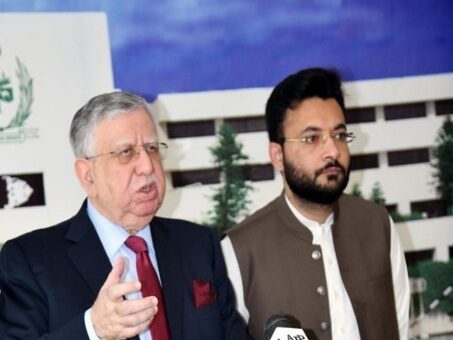The Pakistani government unveiled a mini-budget on Thursday, signaling the withdrawal of tax exemptions amounting to Rs343 billion.
The supplementary finance bill, presented in the National Assembly, primarily targets exemptions related to the sales tax, a consumption tax that could potentially impact the lives of common citizens.
Minister for Finance and Revenue, Shaukat Tarin, clarified in a post-mini-budget conference that the government’s proposal aims to withdraw tax exemptions worth Rs343 billion, with Rs272 billion being refundable or adjustable taxes. He emphasized that the actual imposition of new taxes amounts to Rs71 billion, of which Rs69 billion pertains to luxury items.
Addressing concerns about the impact on the average citizen, Tarin stated, “We have proposed only Rs2 billion tax exemptions on items that can be related to the common man, which would have a very negligible impact on inflation.” He further highlighted that Rs112 billion in tax exemptions on machinery and Rs160 billion on the pharmaceutical sector would be entirely refundable or adjustable.
The minister revealed that the International Monetary Fund (IMF) had initially recommended the imposition of Rs700 billion in new taxes. However, the government successfully negotiated and defended its position, reducing the proposed new taxes to Rs343 billion. Tarin stressed that certain essential items, including food, were exempted from taxation to alleviate the burden on the general public.
“In the past, unjustified taxes were exempted on various items, and now we are rectifying that by withdrawing these exemptions,” Tarin commented during the press conference.
Minister of State for Information and Broadcasting, Farrukh Habib, and Chairman of the Federal Board of Revenue, Dr. Muhammad Ashfaq, joined Tarin at the press conference to discuss the implications of the mini-budget. The government’s decision to withdraw tax exemptions is seen as a strategic move to enhance revenue streams and address fiscal challenges.
While the move might face criticism for potential impacts on the cost of living, the government aims to strike a balance by focusing on luxury items and ensuring that the majority of the new tax burden falls on non-essential goods. The mini-budget will now undergo parliamentary scrutiny and debate before potential implementation, with stakeholders closely monitoring its impact on the economy and the daily lives of citizens.
